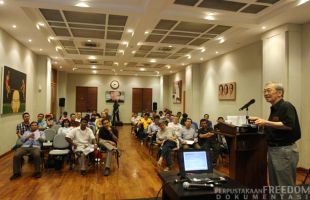“While we are all satisfied with the origin of money can be made and then buy phone stranger. Why are we satisfied with that? Where are our pride? Not understand me,” Tjia May On.
Behind the small podium stiff Tjia May On leaned against the frail. Many times he smiled while a hoarse voice continues eloquently illustrates one major flaw of this nation. The main requirement is that he led the nation’s difficult to compete with developed countries in the world.
“Our problem is the scientific literacy,” Tjia said softly, begin science club discussion in a public library building Freedom Institute, in Central Jakarta, Wednesday (10/10).
The night was Professor of Physics in the field of relativistic quantum particles and cosmology of the Institute of Technology Bandung (ITB) was indeed talking about “Cultural Situation of Research and Advanced Physics”.

“People do not understand what is science. Do not understand what contributed to the advancement of science in the nation. Not know how to advance the science,” complained a man who was born in Probolinggo 77 years ago was in the presence of less than 30 participants and discussion evening it.
Science, according to Tjia, a basic grounding in development. Tjia said the state is having a strong economic and industrial progress. Economy and industry can grow if supported by the research and development that produces a superior product.
Crisis Culture Research
Ignorance of the importance of science is coupled with the chronic crisis in the culture of research in Indonesia. The education system did not support the development of international quality science. It was proven that the lack of incentives, facilities, and the complexity of the bureaucratic nitty-qualified to develop research in the country.
It was compounded by the barren local scientists publish quality work in scientific journals world-class. Not to mention the practice of plagiarism and falsification of data is increasingly prevalent in the local scientists.
In addition, according to Tjia, awareness of the industry to build a base of research and development in Indonesia is still low. In fact, it could support the industry in the long term as well as more efficient.
Tjia program exemplifies Japan with Erato (Exploratory Research for Advanced Technology), which successfully brought the country into one of the rulers of the world economy. Erato adalan research funding program in Japan, which has been running since 1981 and continues today.
In the Japanese program to recruit the best scientists from all fields, from inside and outside the country, to conduct research that could generate new technologies and trends in the world. Each project is given five years to accomplish.
Japan funds expended for research in science since the program was even 40 percent higher than the U.S. spent on similar programs.
“The scientists only need to enter a two-page proposal. Compared with in Indonesia have hundreds of pages, until finally even baseball so his research,” joked lightly Tjia.
Unfortunately, according to Tjia, calls on the importance of science and research culture in Indonesia has never been taken seriously though it is often delivered in a variety of occasions.
“If the English term, it did not ring the bell,” said Tjia.
He hopes the forum discussion on Freedom Institute’s science club over his appeal could resonate and steal the attention of many people, including decision-makers in this country.
